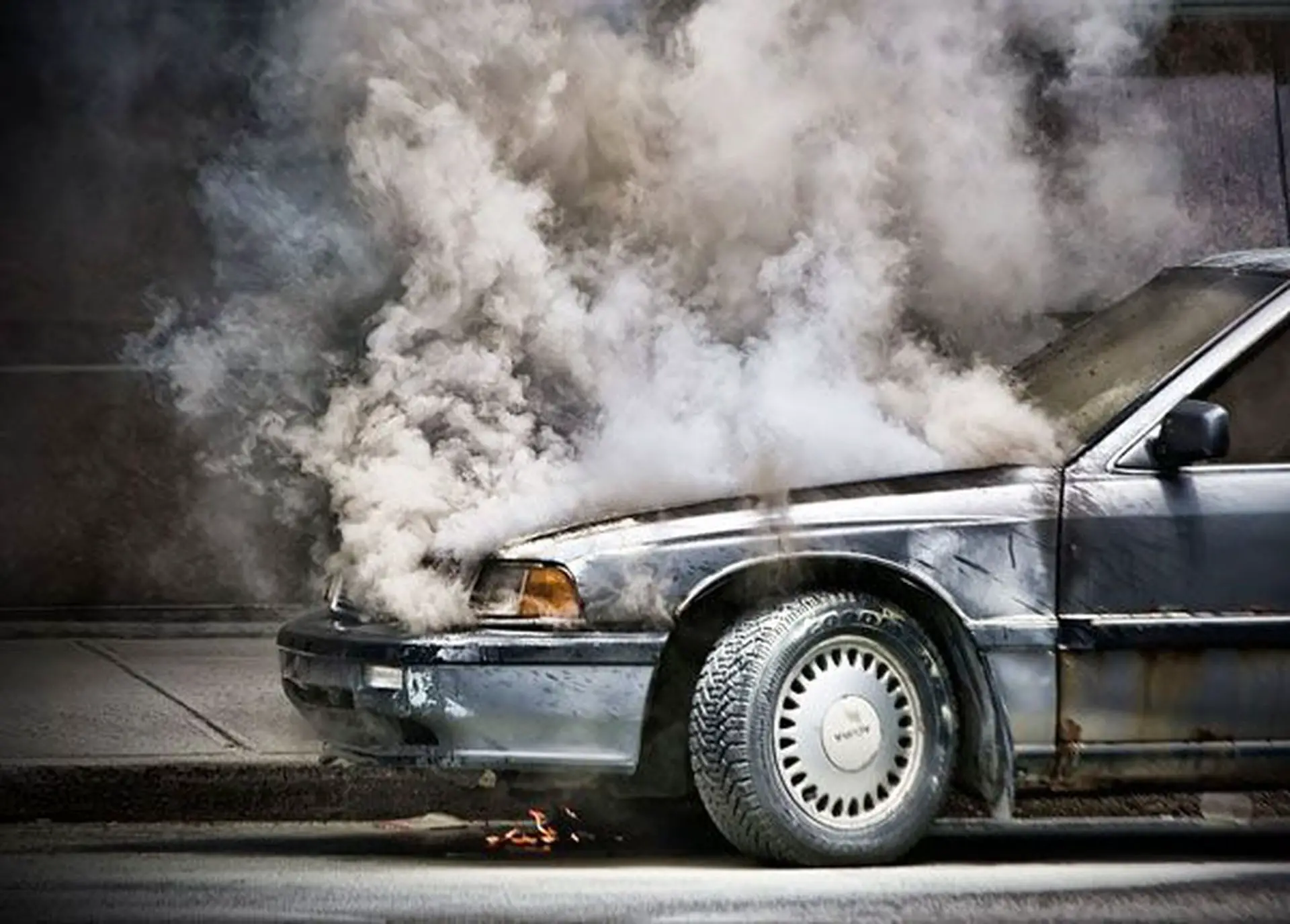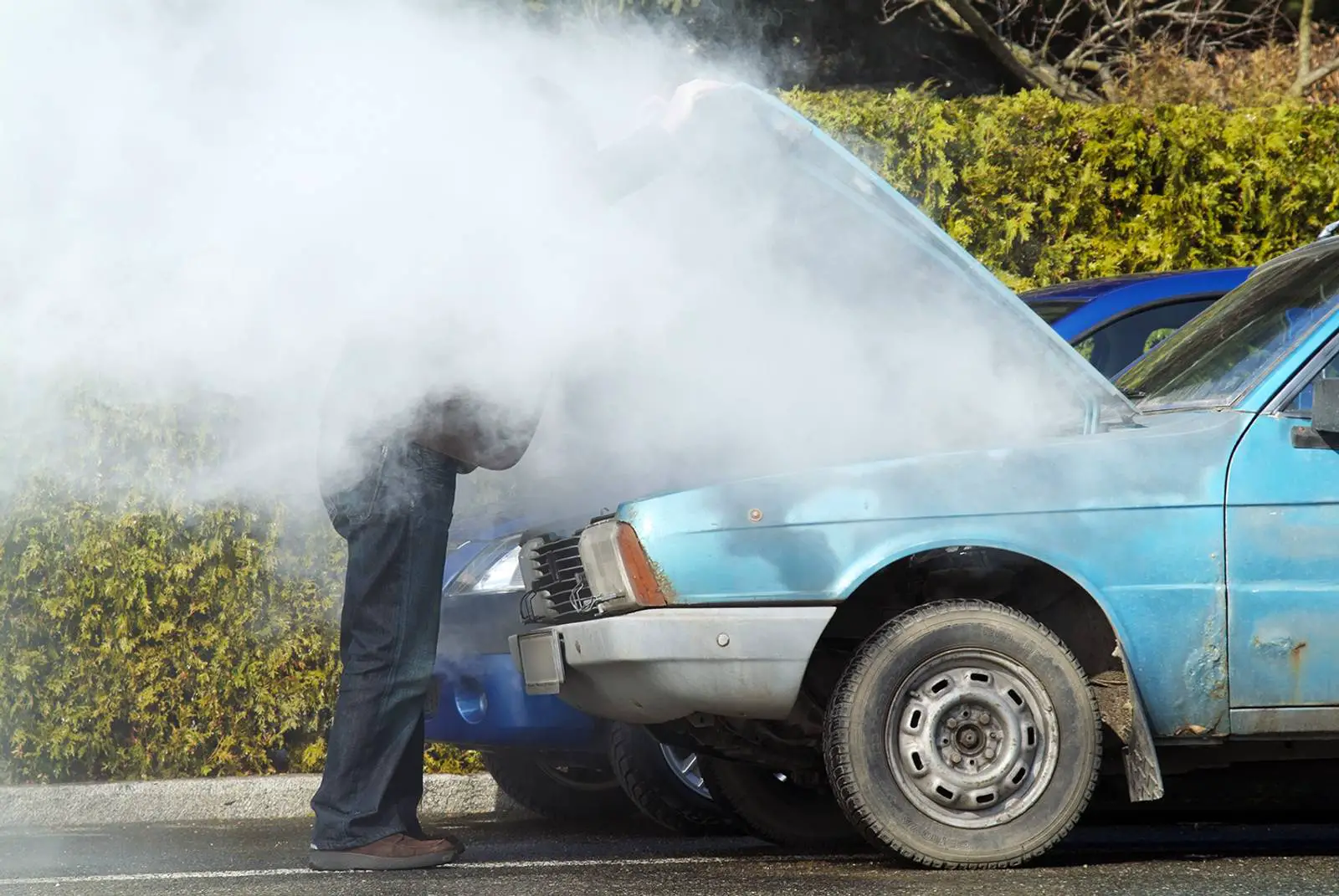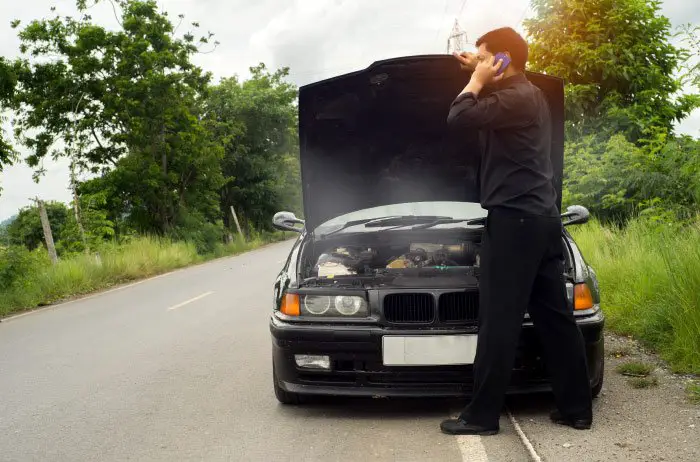Have Your Radiator Flushed By A Mechanic
Even if you keep engine coolant at the right levels, it will eventually get dirty and need to be replaced. A radiator flush, also known as coolant flush, involves draining old coolant from the radiator, cleaning it with flush fluid and adding new coolant. Mechanics recommend a flush every 40,000 miles, but check your owners manual for the manufacturers recommendation.
Improper Coolant Circulation Or Leakage
The coolant functions to keep the engine cool and prevent it from overheating and from freezing in cold. Any loose hose connection in the coolants circulation will cause a severe engine malfunction due to overheating. Hence with cases when there is either leakage or the antifreeze mixture/fluid is not properly circulating the engine, or your car is running low in its coolant level, the engine will start overheating.
Why Do Cars Overheat
Knowing what causes a car to overheat in the first place can help you prevent overheating and reduce damage from an overheated engine. There are a lot of different reasons your car might overheat. Some of the more common reasons include:
Recommended Reading: How To Remove Cigarette Burn From Car Seat
While Your Best Bet Is To Get Help From A Mechanic Your Safest Bet Is To Be Prepared
If your car overheats, do not drive more than a quarter mile. Have it towed to avoid further damage to the engine. However, if there is no experienced mechanic or tow truck nearby, follow these simple steps:
- Pull over to a safe location and turn off the engine.
- Do not open the hood until the car has completely cooled or the temperature gauge has moved from hot to cool.
- Check the coolant level in the radiator. Look in the owners manual if you are unsure where the coolant reservoir tank is.
- Make sure the radiator cap is cool before opening it. Slowly twist it off with a towel and beware of any hot steam. If needed, fill coolant to the top of the radiator. Put the radiator cap back on.
- Be sure the upper or lower radiator hose and any of the heater hoses have not been blocked, disconnected or burst.
- Restart the engine.
- Carefully monitor the temperature gauge. If you see it crossing the optimal mark, pull over to a safe location and turn the engine off.
While your best bet is to get help from a mechanic, your safest bet is to be prepared. Store these essential items in you car: Coolant, tool kit, working flashlight, non-perishable foods and water.
What Do I Do When My Car Overheats

As the brilliant Douglas Adams once wrote in The Hitchhikers Guide to the Galaxy, Dont Panic.
Your car overheating shouldnt propel you into a frenzied fluster, that will only make you nuts and wont solve the underlying problem. Stay calm and pull over to the side of the road. If your A/C is on, turn it off. If you cant pull over and stop the car, turn on the heater, as it will draw in the warm air from the engine and dispel it into the cabin. We suggest rolling down the windows at this point so you dont overheat yourself.
Once youre in a safe location, pop the cars hood and allow it to cool for 5-10 minutes. You can then do a visual inspection of the engine bay to see if the overheating issue was caused by a bad hose, loss of coolant pressure, leaky radiator, or bad fan. If you can repair one of those issues with what you have in the car, do so and head to a mechanics to have it properly repaired. If you cant, youll likely be calling a tow truck.
Also Check: How To Fix A Cigarette Burn In Car
How To Prevent Your Car Engine From Overheating
Dealing with an engine thats overheating can feel like flirting with disaster and something you want to avoid at all costs. To prevent your car from overheating, regular car maintenance is key. You can:
- Maintain coolant levels
- Do regular radiator check-ups
- Perform routine car inspections
Maintenance can lead to prevention, which is always easier and more cost-effective compared to treating an issue.
How To Tell If Your Car Is Overheating
Overheating vehicles dont always have a cloud of thick smoke. Other signs your vehicle may be overheating include:
- White steam coming from under your hood, which looks like smoke.
- The needle on your engine temperature gauge going into the red zone or pointing at H.
- The temperature warning light showing on the dashboard.
- A burnt smell coming from your engine, which could be hot oil.
- A sweet-smelling odor, which could be leaking coolant.
Also Check: How Much Do New Car Salesmen Make
Stand Clear To Rear Of Car
Consider moving yourself and any passengers away from the stranded car. If your car has broken down: at the dangerous junction apex of a corner brow of a hill on a fast-moving road visibility is poor road surface wet or icy, etc.
Moving to a position 200 yards or so to the rear of the vehicle while waiting for the engine to cool will help prevent injury should an oncoming car strike your stranded vehicle.
How To Handle Engine Overheating
If you are driving and your engine begins to overheat, take the following steps:
Turn off the air conditioningThis reduces the strain on your engine and can help it get regulated.
Crank the heater and fan up to full blastThis sounds counterintuitive but doing this transfers the heat away from your engine, giving it a chance to breathe.
Top off the coolant cooling system with antifreeze or waterMany times this will cool things off so you can get to your destination. Keep in mind this could be a temporary fix, so keep an eye on your engine. Note: Because it contains hot water under pressure, be careful when removing the radiator cap. Allow some time for things to cool off before removing the radiator cap and use a rag over the cap to prevent steam burns.
Rev it upIf youre sitting in traffic or at a stoplight, put the car in park or neutral and bring the engine up to 1500RPM to get air and water moving through the radiator. In addition, keep the heat down by staying off the brake pedal when in traffic to keep air flowing through the radiator.
Pull overIf the temperature gauge continues to rise, its time to pull over and call a tow truck to avoid further damage to your engine. Pop the hood from inside the car and let the engine cool for at least 30 minutes before touching anything. Have your vehicle towed to your mechanic for repairs.
Read Also: Where Can I Use Car Care One Card
Leaks In The Cooling System
Leaks are the most important reason a vehicle begins to overheat. Breaks in hoses, the radiator, water siphon, indoor regulator lodging, warmer center, head gasket, freeze plugs and a couple of different things would all be able to prompt issues with the vehicles cooling framework.
If you speculate a break or have needed to add coolant to the repository dont hold on to get it checked. A little break can rapidly go into a costly fix and genuine cerebral pain.
Do Not Try To Open The Hood Of Your Car Until The Vehicle Has Cooled Down
Once the vehicle is at a complete stop and turned off, do not lift the hood. Depending on how long the vehicle has been running, the coolant in the vehicle could be increasing in temperature to an extremely hot level, and essentially pressurizing in the cooling system itself. Only once the vehicle has completely cooled down will it be suitable to attempt to open the hood. The vehicle should be allowed to cool down naturally before opening the hood.
To confirm that the vehicle has appropriately cooled down, monitor the temperature gauge in your vehicle as it moves from HOT to COOL, which may take upwards of 30 minutes. Depending upon the vehicle you drive, the temperature gauge may only be functional when the ignition is in the accessory or on position. During this step, its important to not start the engine, and in this situation, only activate the ignition to the on position to read the temperature gauge.
Don’t Miss: Typical Car Sales Commission
Why Does A Car Lose Power When It Overheats
A car will commonly lose power when it overheats simply because the cylinder head expands and allows cylinder compression to escape past the cylinder head gasket. This often also causes a no-start after the engine overheats. Its a serious condition and can cause damage to the head-gasket or warping of the cylinder head.
The cylinder head gasket is, as you may know, a graphite material thats sandwiched between the top and bottom halves of the engine. Its function is to seal the combustion chambers and keep oil and coolant separated.
A leak-down test or an exhaust chemical analyses kit are the two most common tests for a suspected head-gasket fault. You can check out these tools on the Coolant system tools page or check out the Amazon link below.
Why Is My Car Overheating When The Coolant Is Full

If your car is still overheating, even if your coolant reservoir is full, you may have an issue with another part of your engine. An engine may overheat if the coolant is not circulating fully through the system.
Other possible issues could be a faulty water pump, problems with a belt, low oil, an incorrect air-to-fuel ratio, a broken engine fan, or a failing thermostat. Take your car to your local mechanic for a diagnosis.
You May Like: Get My Title Florida
How Do I Know If My Cars Engine Is Overheating
There are two distinct signs that your engine is overheating. First and foremost, a malfunction warning light will begin to glow on your instrument panel. The warning is typically red or yellow and ominous. It is meant to get your attention because you need to take quick action.
The other sign that your engine is overheating is the plume of white or light gray vapor that comes from the leak in your cooling system. As you drive it is often difficult to see because it trails behind as your vehicle moves forward, but at a stoplight, it appears as though your car is creating its own fog.
What To Do If Youre In Traffic
Being stuck in a nasty jam with a car beginning to show signs of overheating is a pretty unpleasant scenario. You can make the best out of the situation, however, and possibly save your car a lot of damage, if youre alert to the warning signs and respond swiftly. If youre in non-moving, gridlocked traffic, put your car in neutral or park and rev the engine. This technique is designed to encourage water and air flow through your radiator, helping to cool the engine down. If youre in stop-and-go traffic, alternatively, try to creep forwards rather than move jaggedly in fits and starts of braking and accelerating, which is important because braking generates a lot of friction, which will only exacerbates the problem. Remember, when you get to a safe place to stop, turn off the engine, pop the hood, and wait.
Loved this article? Like or share!
The above information is for reference only. Kwiksure takes no responsibility for the accuracy and timeliness of the information. For the coverage, mode of compensation, benefit limit and premium levels of any specific insurance plan, please refer to the relevant policy terms.
Read Also: How To Program A Car Computer
Warning Signs Of An Overheated Engine
There are a number of warning signs and causes of engine problems. An overheating engine is no different. There are a few things to look out for when it comes to possible engine trouble, lets talk about those below:
- Steam coming from under the hood
- The temperature gauge on the dashboard begins climbing toward the H or high level
- You smell strange odors coming from the car: A coolant leak typically produces a sweet smell and an oil leak will produce a burnt odor.
Your engine may begin to overheat due to a few different reasons. Two common problems that arise include:
- The vehicles cooling system may not be allowing heat to leave the engine compartment due to a leak or blockage.
- Rubber hoses, gaskets, and water pumps may spring a leak. This can be caused by normal wear.
What To Do When Car Overheats And Wont Start
- Turn off the engine and park under a shade.
- Leave the engine hood open.
- Open the windows.
- Add water and coolant to the radiator.
- Disable air conditioning.
- After 20 minutes, try revving the engine mildly.
The car should now start. However, if the car does not start, inform the mechanic or wait a little longer and try revving the engine again.
You May Like: How Car Salesmen Get Paid
What To Do If Your Car Is Overheating: Step By Step
The safest option on what to do if your car is overheating is to find a safe location and pull over. If the vehicle is overheating, driving with a potentially damaged engine may result in permanent damage.
If you are unable to come to a complete stop in a safe and clear area, keeping the vehicle moving slowly may still allow a constant airflow around the motor to aid in natural cooling. Leaving your car at rest with the engine running may aggravate the problem, causing additional and unwanted heat to be produced. If you cannot stop just yet, put your car in neutral or park, then start it up and rev the engine. This causes the fan and water pump to spin faster, pulling more air and water through your car’s radiator. The increased circulation helps to cool the engine.
Turning off the air conditioning and increasing the heat to high while the vehicle is still moving may help to draw additional heat away from the engine.
The objective is to generate as much heat as possible. Another method for allowing heat to escape the vehicle is to roll down and open as many windows as possible.
Why Is My Engine Overheating
Before we can go over how to deal with engine overheating problems, we should first explore why your engine might be overheating in the first place. Typically, higher temperatures in the engine are caused by some issue with the cooling system, trapped the heat in the engine compartment instead of letting it escape. The source of the issue could include a cooling system leak, faulty radiator fan, broken water pump, or clogged coolant hose. Either way, an overheating engine isnt something you want to let linger. Your engine could sustain serious, if not permanent and expensive, damage.
Also Check: Connect Laptop To Car Computer
Dont Ignore The Issue
An overheating engine wont resolve on its own, even if it seems to be fixed after you add a little coolant. It will only get worse if left unaddressed. Get to the root of the issue to help save your engine. Bring your car to AAMCO Bay Area for an initial vehicle check so we can accurately diagnose the problem and get your vehicle back on the road safely.
What To Do When Your Car Is Overheating

This depends a lot on where you are actually at are you on the open road cruising along or are you stuck in stop and go traffic? You dont have all that much time, but you may be able to buy yourself a couple of minutes to get off the road and call for a tow.
- Turn off the AC. More than likely it is probably summertime when your car overheats. And yes its hot outside, but the air conditioner in your car puts an incredible load on your engine. Shutting it down will relieve a great burden on your motor and may buy you the time you need to get to a safe location. But this is not the only thing you need to do and you are really not going to like the next step
- Turn on the heater, like full blast. I am talking fans on high and temperature all the way over in the red. I know its summertime, and youre going to be really uncomfortable soon. But as with turning the AC off, turning the heat on is a necessary evil. Why?
- The normal operating temperature for an engine is 195 220 degrees Fahrenheit, so an overheating engine in excess of these temperatures turning on the heater transfers heat from the engine compartment to the passenger cabin .
- Well discuss the damage that can happen to an overheated engine later, but it could literally be thousands of dollars worth of damage to your car. So roll down the windows and make the best of it. By turning the heater on you may get yourself to safety and save yourself a hefty repair bill.
Also Check: 2.5 Car Garage Size
